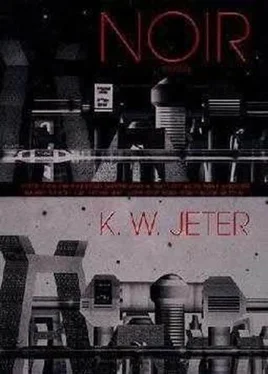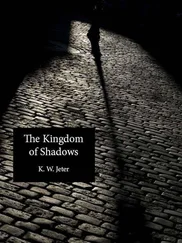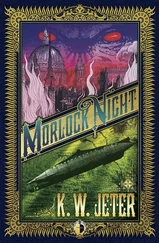K Jeter - Noir
Здесь есть возможность читать онлайн «K Jeter - Noir» весь текст электронной книги совершенно бесплатно (целиком полную версию без сокращений). В некоторых случаях можно слушать аудио, скачать через торрент в формате fb2 и присутствует краткое содержание. Жанр: Фантастика и фэнтези, на английском языке. Описание произведения, (предисловие) а так же отзывы посетителей доступны на портале библиотеки ЛибКат.
- Название:Noir
- Автор:
- Жанр:
- Год:неизвестен
- ISBN:нет данных
- Рейтинг книги:5 / 5. Голосов: 1
-
Избранное:Добавить в избранное
- Отзывы:
-
Ваша оценка:
- 100
- 1
- 2
- 3
- 4
- 5
Noir: краткое содержание, описание и аннотация
Предлагаем к чтению аннотацию, описание, краткое содержание или предисловие (зависит от того, что написал сам автор книги «Noir»). Если вы не нашли необходимую информацию о книге — напишите в комментариях, мы постараемся отыскать её.
Noir — читать онлайн бесплатно полную книгу (весь текст) целиком
Ниже представлен текст книги, разбитый по страницам. Система сохранения места последней прочитанной страницы, позволяет с удобством читать онлайн бесплатно книгу «Noir», без необходимости каждый раз заново искать на чём Вы остановились. Поставьте закладку, и сможете в любой момент перейти на страницу, на которой закончили чтение.
Интервал:
Закладка:
A few minutes later, he felt the train come to a stop, the outmoded diesels up ahead wheezing and shuddering. In this segment of the Gloss, on a local milk run, the Rail Amalgam didn’t put its shiny new or newish rolling stock, its sleek maglevs and other high-speed bullets. Transit for visiting the dead called for rolling antiques, bolted-together retrofits, rust and grime that could be sent along the tracks more or less in formation, the heavy ghosts of industrial society. Unmanned, either by passengers or crew; a few black boxes had been wired to the engines, the embedded piloting systems linking up with whatever sensors and bar-code readers were still operational along the right-of-way. That was enough for the job; if any of the trains ceased functioning en route and couldn’t be fixed with more than a change of fuses or a simple board-swap, it was bulldozed off the tracks and left as a long parallel corpse, to decay into the underlying mulch of corroded metal.
McNihil hoped that wasn’t going to be the case right now; he didn’t want to get out and walk the rest of the way to his destination. He could hear, rattling through the train’s loose-jointed steel bones, the various servo-mechanisms desultorily futzing around with the engines, trying to get them going again. Something clanked, metal on metal, one blow after another; the image came to him of some articulated iron arm, speckled with rust and oil spots, swinging a sledgehammer or a giant boilermaker’s wrench against the dented side of the ancient diesels, a last low-tech resort.
The clanging sounds continued as McNihil gazed out the window. Ordinarily, he wouldn’t have minded the prospect of hoofing it the couple of hours it would take to get to his dead wife. Even in a depressing territory like this, the notion of seeing her again would have made the trek semibearable. Those were other times, Jack , he told himself. Coming down here before, he’d been on no other mission except seeing her, for no reason but to twist tighter the little knot of guilt that lay beneath his heart. If not pleasure, there was always a certain broken-tooth satisfaction to be gotten out of such a grim excursion, the confirming knowledge of just how much of a sonuvabitch one could be. And had been.
On the other side of the dust-mottled glass, a few slowly moving figures could be seen, going about their business in the rubble and ashes. The vaguely human shapes-they were so hunched over in their rags that it was difficult to make out their true forms-had devolved much farther down the scale than their beggarly counterparts in the cities elsewhere in the Gloss. The communard panhandlers and hustlers that McNihil usually encountered on his travels still had some detectable barrier between themselves and their surroundings, an envelope on one side of which was the however-loathsome definition of human, and on the other side was insentient matter. In this bleak territory, that border phenomenon had been erased: here, whatever looked and/or acted more-or-less human-usually less-did so as a point on a continuum that ran back down into the trash and rubble filling the streets and burnt-out building hulks. As if muck and sun-withered debris had become such a basic constituent of this part of the universe, the way hydrogen atoms abounded everywhere else, that it could have begun its own hobbled evolution, knitting together creatures from scraps of old, greasy fast-food wrappers and flaccid, discarded condoms. Instead of dead things, perhaps they were the yet-to-be-alive, lifting their soft faces from the rotting Eden they were to inherit, prepared for them by a God of Discards…
A sudden jolt snapped through the seat and into McNihil’s spine; the train lumbered into motion, as though pulling itself from the mire that had trapped other great beasts. The scene outside the window began to slide farther back along the rails. A small breath of gratitude eased from beneath McNihil’s breastbone. Another few moments and the rag-picking shamblers, the bottom stratum of this zone’s animated dead, would have looked up and spotted his face. They would have lifted their hollow-eyed gaze to his, then nodded slowly. Saying without words: Pass on, Traveler. As we are, so shall you be .
“How was your trip?” His dead wife looked up at him as he walked through the door. “Was it all right getting here?”
From his shoulder, McNihil eased the strap of the bag he’d brought with him. The train from the land of the nominally living to that of the officially dead had finally creaked and wheezed into the local station, like a senile long-distance runner clutching his chest and expiring as he collapses across the finish line. The station, the same one at which McNihil always disembarked when he visited his wife, was really just the place where the tracks came together from different directions, including the no-longer-functioning ones that ran into the east, into the center of the continent. Whatever came out of here, the pretty boys and girls who were the heartland gene pool’s only viable export, arrived on foot. As had McNihil at the place where his wife existed-the word lived was too cruel a misnomer to be applied in her situation.
“It was okay. About like usual.” He sat the bag down on the kitchen table, a rickety construct of plywood sheeting with reinforced fiberboard boxes for legs. As with most things in this territory, it survived from day to day, caught somewhere in the process of collapse and dissolution. The table wobbled and bent under the slight weight of the shoulder bag; the nails-which McNihil himself had hammered in-gave small, harsh cries as the loose joints twisted against each other. “Nothing happened on the way, at least.” He turned a minimal smile in his dead wife’s direction. “For me, that makes it a nice trip.”

She said nothing, but went on watching him with her ’d-out eyes. Empty, but not in the way that living persons’ eyes so often were, when they had let their souls ratchet down into a state of pure mercantile hunger. Hungry , McNihil had told himself more than once, is not her problem. Not anymore . In that sense, she had an advantage over both the living and the other dead. He could console himself with the notion that he’d done that much for her, at least.
“I suppose you brought me stuff.” She sat beside the table, in an only slightly less fragile chair. If she’d possessed more mass than was typical for the long-term, animated dead, the chair might have collapsed beneath her; as it was, she had no more effect on it than a ghost or living memory would have. “You always bring me these little things.” In one hand, held near her face, a cigarette slowly drifted a gray trail through the dusty air. The pack had been one of the gifts McNihil had brought her the last time he’d come down here. She didn’t smoke, not in the sense of drawing anything into her motionless lungs. But the spark and ash were reminders of her previous existence. And of mine , brooded McNihil. “I appreciate your thoughtfulness,” his dead wife said.
He would’ve preferred it if she had screamed like some sudden banshee and buried a knife in his heart, one of physical metal to match the invisible one whose blade he felt turning there. But perhaps that was why, he knew, she didn’t do any such thing. Besides not being her style, it would have made it all too easy-and over-for him. She still loved him enough to torture him.
Nodding slowly, McNihil zipped open the shoulder bag and started pulling its contents out onto the flimsy table. The items were all bright and shiny and new, things from the land of the living. They didn’t have to be expensive, he knew, though sometimes he spent the money anyway, just as one of the milder forms of self-laceration available to him. Stuff that wasn’t even anything his wife had cared for when she’d been alive:
Читать дальшеИнтервал:
Закладка:
Похожие книги на «Noir»
Представляем Вашему вниманию похожие книги на «Noir» списком для выбора. Мы отобрали схожую по названию и смыслу литературу в надежде предоставить читателям больше вариантов отыскать новые, интересные, ещё непрочитанные произведения.
Обсуждение, отзывы о книге «Noir» и просто собственные мнения читателей. Оставьте ваши комментарии, напишите, что Вы думаете о произведении, его смысле или главных героях. Укажите что конкретно понравилось, а что нет, и почему Вы так считаете.












